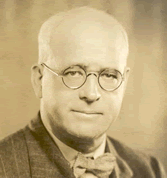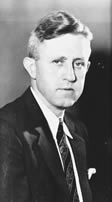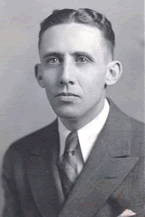
<<
Back
Three
men molded the speech department in the modern period, Harry B.
Gough and his two protégés, Robert E. Williams and
Herold T. Ross. The Kentucky-born Gough, who earned both an A.B.
and A.M. from Northwestern University before serving as a Methodist
pastor in Illinois and as president of Hedding College, was named
DePauw's first professor of public speaking and debate in 1907.
He soon became a popular figure on campus, known among other things
for his booming voice and his unusual locutions. "By the great
horned spoon" was one of his favorite expressions.


In addition to training outstanding orators and debaters, Gough
had a large part in introducing theatre to DePauw in an era when
its Methodist constituency still tended to frown on stage performances.
In 1914 he founded the dramatic society Duzer Du, which survives
to the present. The author of two books on public speaking, Gough
was elected president of the National Association of Speech Teachers
in 1923. After 29 years as head of the speech department at DePauw
he retired in 1935 but lived on in Greencastle until his death 10
years later.
In 1921 Gough brought one of his students, Robert E. Williams, back
to DePauw as the second member of the speech department. Williams,
who graduated in the class of 1916, enlisted in the American Ambulance
Service and saw action on the North Italian front in World War 1.
After teaching briefly at Knox College and the University of California,
he earned an A.M. at the University of Wisconsin in 1921. His forte
was oral interpretation and dramatics, and he became director of
the Little Theatre. He organized a chapter of the National Collegiate
Players at DePauw and was elected its first national treasurer.
Like his mentor, Gough, he was a popular chapel speaker, known especially
for his entertaining dialect stories. Retiring in 1957, he taught
part-time for another decade. He died in Greencastle in 1982 at
the age of 91.

The third man to join the department was another of Gough's students,
Herold T. Ross, who came to DePauw as a freshman in 1914 from his
hometown of Rochester, Ind. He later recalled how he was met at
the railroad station by a group of Sigma Nus, who transported him
by horse and buggy to their house and immediately pledged him to
the fraternity. Near the end of his senior year he joined the Army
and saw active service in France in the Argonne. After the war,
he taught briefly in high schools and at Iowa State University,
was English master at Cutler Preparatory in New York for a year,
and earned an M.A. at Columbia University.


Ross began teaching at DePauw in 1927 and five years later completed
his Ph.D. from the State University of Iowa with a dissertation
on DePauw graduate Senator Albert J. Beveridge. He was active in
the university's program in oratory, debate and drama and became
head of the speech department on Gough's retirement in 1935. He
was chiefly responsible for inaugurating DePauw's radio station
WGRE-FM and also introduced work in television programming. He served
a term as national president of the speech honorary society Delta
Sigma Rho. After his retirement in 1961 he served one year as assistant
dean of the university and taught at Butler, Hanover, Wabash, and
Central Missouri. In 1986 the Indianapolis Star granted him the
Jefferson Award for community service, especially in his leadership
role in the American Association of Retired People. At present he
is a vigorous 91 and rarely misses a university function.
Back
to Top
<<
Back
|







